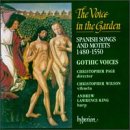| All Artists: Gothic Voices, Page Title: Voice in the Garden: Spanish Songs & Motets 1480- Members Wishing: 2 Total Copies: 0 Label: Hyperion UK Release Date: 10/5/1993 Album Type: Import Genres: Special Interest, Pop, Classical Styles: Vocal Pop, Opera & Classical Vocal, Chamber Music, Historical Periods, Early Music Number of Discs: 1 SwapaCD Credits: 1 UPC: 034571166537 |
Search - Gothic Voices, Page :: Voice in the Garden: Spanish Songs & Motets 1480-
 | Gothic Voices, Page Voice in the Garden: Spanish Songs & Motets 1480- Genres: Special Interest, Pop, Classical
|
Larger Image |
CD Details |
CD ReviewsBeautiful Spanish Music tenordan | rural, old fashioned, small town Maine | 06/18/2001 (5 out of 5 stars) "This is the first cd by Gothic Voices I ever bought and it remains my favorite. They are my favorite early music vocal ensemble because they let the music speak for itself. The pieces on this recording are beautiful examples of the different styles found in Spain in the 15th and 16th centuries. There are polyphonic motets and homophonic love songs as well as some pieces for solo vihuela (related to the guitar) and solo harp. The rhythms are often lively and the harmonies full and sweet. The singing is wonderful- very focused and pure, in a vibrato-free early style, but each voice still has character and expression. One of the things that distinguishes Gothic Voices is the organization of some of their their recordings by themes, not just by time period or composer. The theme of this one is stated in the wonderful notes that are included: "This recording is an exploration... of men and women in their fallen state, expelled from Eden with a sword." In many of the pieces there is a sense of longing for something lost- the loss of innocence or of a lost love, or the longing for paradise. I don't think you can go wrong with a cd by Gothic Voices. And if you are new to the group, this cd would be a nice place to start." Academically extreme + GV not at their most polished Maddy Evil | London, UK | 05/10/2005 (4 out of 5 stars) "There are always, with any recording of early music, 2 fundamental elements: a musicological one (do the resulting performances bear any relation to what was originally heard?) and an aesthetic one (does it sound good?). Regarding the former, this recording by Gothic Voices provides no exception from their previous releases of pre-1500 music, unsurprisingly given Page's renown as a musicologist. Indeed, there can be little doubt that Cancionero repertory was often performed by voices alone (interested readers should consult the article by Tess Knighton, "The a cappella heresy in Spain...", Early Music XX (1992), pp.560-81). On the other hand, Page is extreme in dismissing 'ensembles of mixed voices and instruments' and the use of viols as anachronistic [liner notes, p.3]. At least one extant contemporary account confirms that the romance (a polyphonic genre) was performed by minstrels and singers 'con sus laudas, y vihuelas, y otros ynstrumentos' (Knighton, pp.577-8). In addition, Oviedo's account of Don Juan (the heir to the throne) proves that people who sang Cancionero repertory (and therefore read notation) also played certain instruments - amongst them 'vihuelas de arco' [i.e. viols]. In any case, it would have been interesting if Page had perhaps exploited the numerous descriptions of multiple voices [trebles] on the top part rather than his favoured one soprano or one alto (especially given his emphasis on scholarship)...
Turning to the aesthetic element, only personal taste can dictate whether this is a successful recording or not; yet for my money, this CD is quite inferior to GV's best recordings, such as The Service of Venus and Mars (Hyperion CDA66238) or The Castle of Fair Welcome (Hyperion CDA66194). Over-emphasis on pseudo-Hispanic accents creates a sound-world which is a) not particularly aesthetic (contributing to moments of patchy intonation), and b) somewhat pastiche (compare these performances with those [also a cappella] of La Colombina [Canciones, Romances, Sonetos...., Accent ACC95111], whose members include several mother-tongue Spanish speakers). The devotional villancicos and motets are more convincing [tracks 10 + 13, etc.], although it is arguably the instrumentalists - Christopher Wilson (vihuela) and Andrew Lawrence-King (harp) - who are the true stars of this recording, providing solos that are sensitive, suave and occasionally virtuosic. In short, it is difficult to know for whom this recording could be recommended: for those new to this group, there are numerous outstanding GV recordings which should be explored above this one (alongside the 2 above-named, try also The Spirits of England and France, Vol. 4: Missa Caput and the story of the Salve Regina [CDA66857]). Those looking for a cappella recordings of Cancionero repertory should also consider either La Colombina (named above), the Orlando Consort (The Toledo Summit: Early 16th c. Spanish & Flemish songs & motets, HMU 907328) or Ensemble Gilles Binchois (Sola m'ire - Cancionero de Palacio, Virgin Veritas 7243 5 45359 2 5). For those simply wanting a recording of Cancionero repertory, well, the list is literally endless - from the fantastic (if anachronistic) performances of Jordi Savall (on Auvidis Astree and Alia Vox, such as Isabel I: Reina de Castilla) to smaller ensembles (notably Circa 1500 [Music from the Spanish Kingdoms on CRD] and the New London Consort [Music From The Time Of Columbus on Linn]), or even interpretations which are arabic-inspired (Begona Olavide's Mudejar [MA recordings]) or flamenco in style (Mercedes Hernandes and the United Continuo Ensemble [Raum Klang] - available on amazon sites for France, UK and Germany). In short, it just depends on what you're after...!" |

 Track Listings (23) - Disc #1
Track Listings (23) - Disc #1